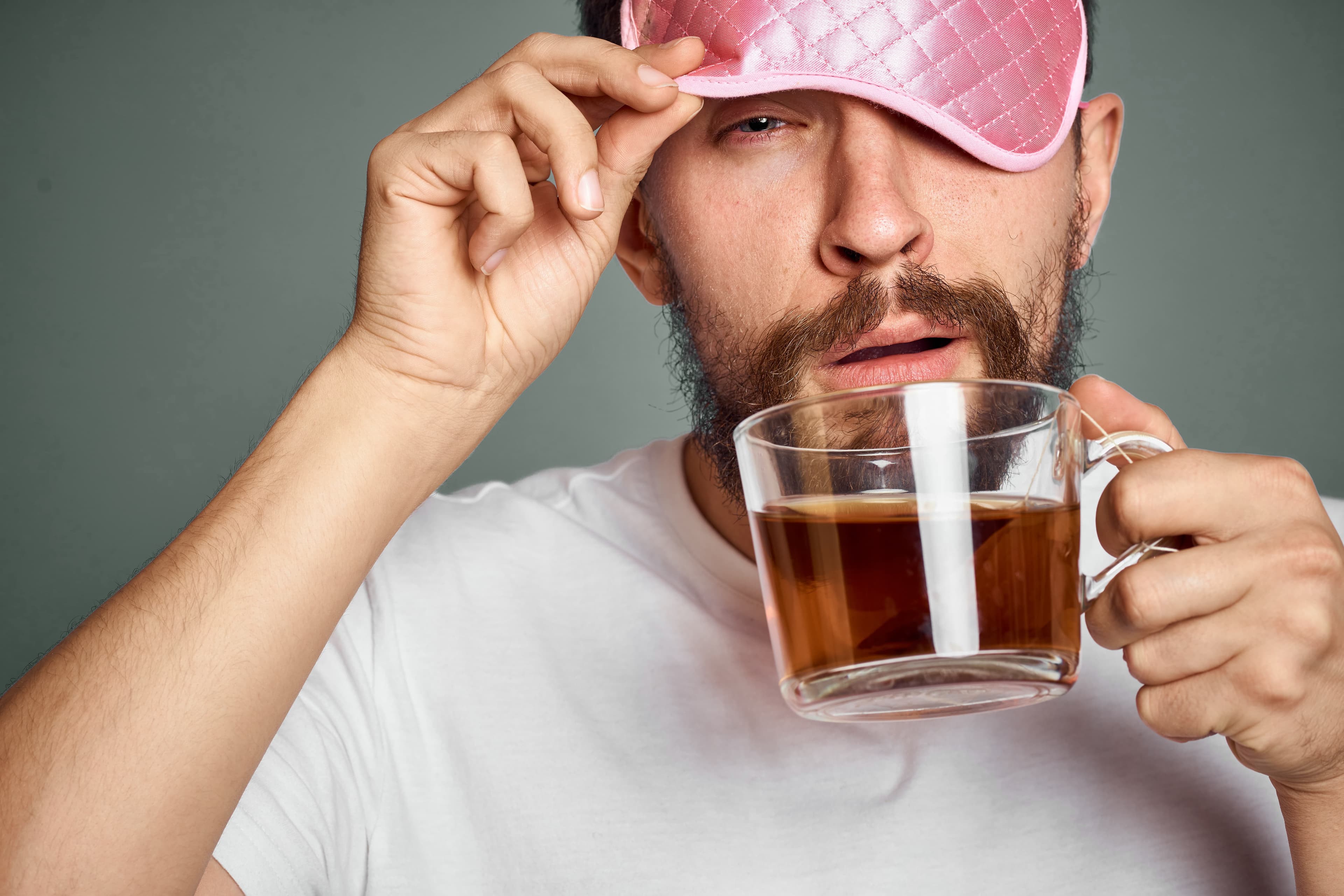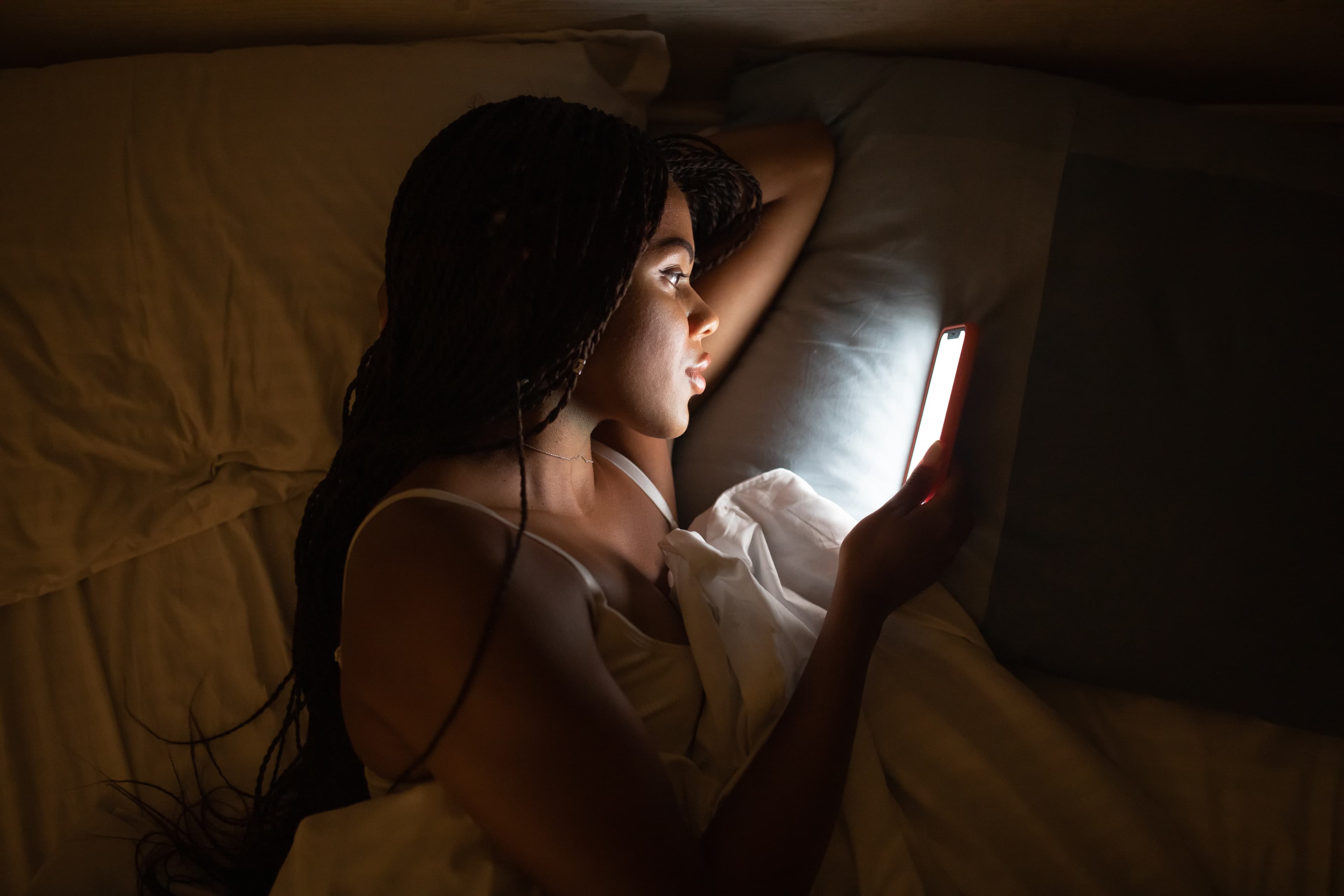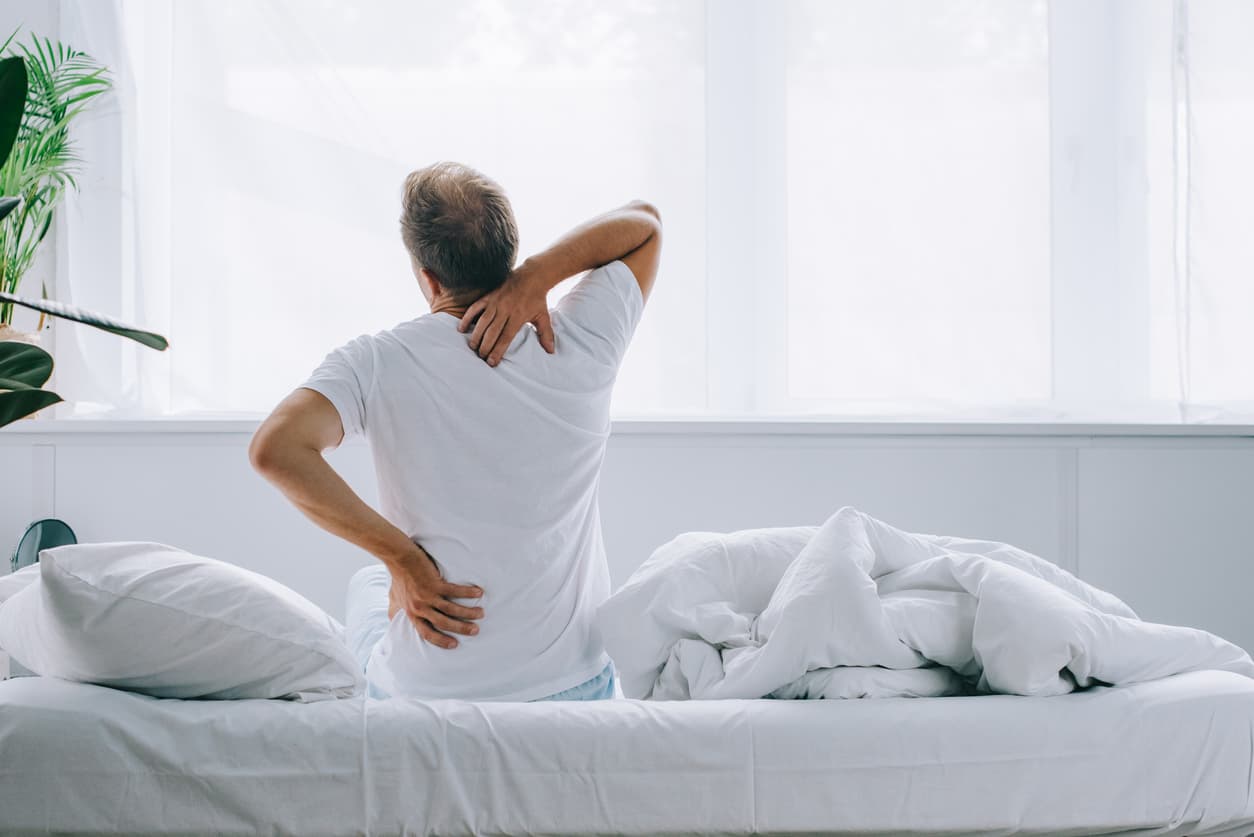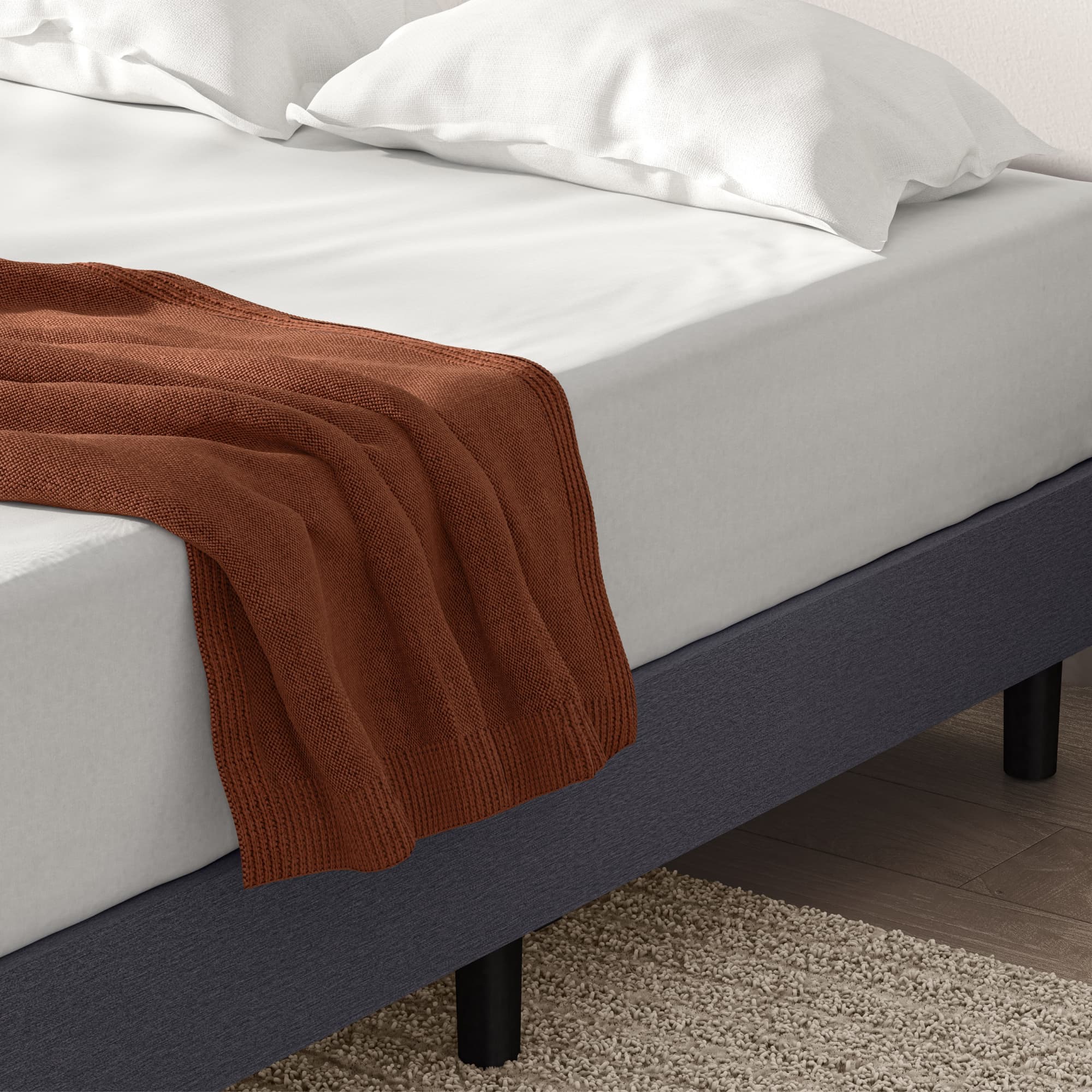It's hard to de-stress and prepare for a good night’s sleep t with all of the pressures of modern life weighing on you. Between your big work presentation, your kid's science project, and the laundry piling up, it can be almost impossible to shut down for the night.
While there are many different ways to relax and unwind after a long day, have you ever thought about adding tea to your nightly routine?
Not only can the ingredients in some types of sleepy teas help you sleep. But the almost meditative process of making and sipping tea can help you destress and create a nighttime routine to promote deeper, better rest.
Should You Have Caffeine Before Bed?
Drinking a lot of caffeine before bed is not advisable. After all, the primary function of caffeine is to improve mental alertness. Once you consume caffeine, it takes about an hour for the effects to kick in. And they can last anywhere from 2 to 5 hours, depending on your dosage. Caffeine is found in many products—but you can find it in popular items like coffee, tea, soda, and energy drinks.
Most teas are naturally caffeinated but have less caffeine than a typical cup of coffee or espresso (which is also naturally caffeinated).
Matcha, a concentrated powder form of green tea, is the strongest type of tea. It has about the same amount of caffeine as a cup of coffee. Black and white teas have less caffeine than coffee or matcha, and herbal teas have the least caffeine (very little or none).
Can Tea Help You Sleep?
The answer is both yes and no—it largely depends on what kind of tea you're drinking and how your body responds to caffeine. In general, tea is great for bedtime. From preparing it to sipping it, tea has a calming effect. The ritual of bedtime tea can help you wind down at night and improve sleep quality.
As a nighttime ritual. Drinking tea has become a nighttime ritual for many people. Boiling the water, steeping your tea, and waiting for it to be ready to drink can be a very tranquil, mindful experience. It helps your brain and body wind down from your crazy day, making preparing the tea as relaxing as drinking it.
Get you in the mood to sleep. Incorporating tea into your bedtime routine can get you away from your screens and into the mindset of sleep.
By taking 20 minutes to sip a cup of tea at night, you get a chance to decompress and unwind. This is instead of scrolling through social media and exposing your brain to blue light before bed. Sipping tea can also help get you to a meditative state so you can reflect on your day. Rather than being in front of a screen before you go to sleep.
Some ingredients in tea help sleep quality. Although it is caffeinated, Green tea has an ingredient called L-theanine that can help you focus and relax.
Many people like to have green tea or matcha during the day. This is using theanine's focus effects mixed with the benefits of caffeine to help them concentrate. But green tea isn't just good for waking up in the morning—you can also benefit from green tea at night.
If you're not super sensitive to caffeine, a little green tea at night might give you the push you need. Either to finish the rest of your work and get through your kids' bedtime routines, so you can finally get some rest. Plus, theanine can help you feel relaxed and calm pre-bedtime. If you're one of those people who can't have caffeine after 2 p.m. (or you'll be up all night), green tea is also available in a caffeine-free form.
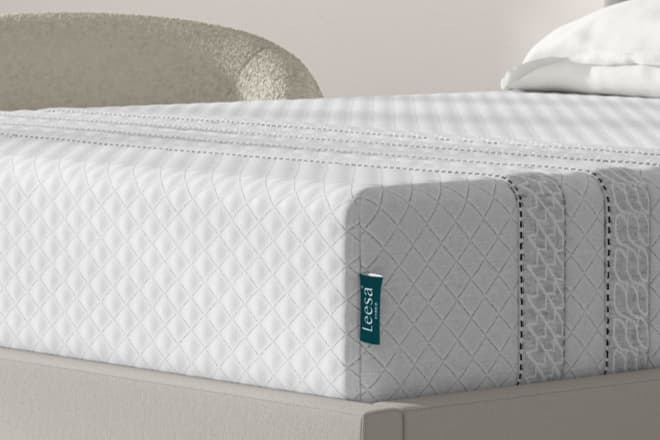
What Tea Helps You Sleep?
You don't want to have a lot of caffeine before you go to sleep, so if you're going to have tea before bed, you'll want something with very little to no caffeine.
Caffeine-free herbal teas, like chamomile, valerian root, or peppermint, are excellent choices. Many companies make teas specific to help you fall asleep and sleep better. They're often called sleepy tea or nighttime tea and come in simple, ready-to-brew tea bags; drop one in boiling water, and you will be on your way to feeling relaxed and drifting off to sleep!
Chamomile Tea
Chamomile tea is one of the best herbal teas for bedtime because it is caffeine-free and contains sleep-inducing ingredients like terpenoids and flavonoids . In a study with sleep-disturbed postnatal women, drinking chamomile tea helped with their sleep problems like insomnia. It also helped decrease anxiety and stress.
Chamomile tea can also help improve your digestion, ease menstrual cramps, and boost immunity. In addition, you can drink chamomile tea with a touch of honey to relieve headaches and migraines!
Green Tea
Green tea (especially decaf) contains theanine , which can help you feel calm at bedtime. However, regular green tea does contain caffeine, so be careful if you're sensitive to it.
Peppermint Tea
Peppermint tea from the mint family is another excellent herbal tea option to help you fall asleep. It has little to no caffeine and can help settle your stomach, too.
Lavender Tea
Drinking lavender tea allows you to relax your muscles, calm your nerves, and slow your breathing thanks to a compound called linalool. Lavender, in general, can be beneficial at night and can help lessen stress and anxiety. In addition to drinking it as lavender tea? You can use lavender aromatherapy by adding a few drops of lavender essential oil to your pillow at night. You can also diffuse the oil on a diffuser to experience its calming effects.
Lemon Balm
A compound in lemon balm tea called rosmarinic acid lowers stress and anxiety and helps in treating insomnia. Drinking lemon balm tea with its sweet, citrusy aroma of lemon balm tea is a calming option for a sleep tea if you're looking for a caffeine-free way to relax and prepare for restful sleep.
Passionflower
This sleep-enhancing herbal tea is similar to chamomile. It can help you sleep better and may even reduce anxiety. Some report even a single cup of passionflower tea can help prepare you for a great night's sleep. One of the secrets of passionflower seems to be the flavonoids that bind to brain receptors in an anxiety-reducing way.
Valerian Tea
Valerian tea is made from valerian root. Valerian root has mild sedative properties, and many people use it as a sleep aid to treat poor sleep and anxiety. You can purchase valerian root tea as loose tea or as teabags.
People report feeling less stressed and nervous after drinking a cup of Valerian tea. It may also help with heart palpitations and headaches. Add a little honey or maple syrup for a sweet touch to the earthy, bitter taste.
Magnolia Bark Tea
Try this traditional Chinese herbal tea to prepare your mind to fall asleep. Magnolia bark tea has compounds called magnolol and honokiol . These compounds can help improve your sleep quality and treat symptoms of stress and anxiety. It can also help with weight loss and even cancer .
You can take it as part of your herbal supplements if you don't care for its earthy natural taste.
Tea Tip: if you have a tea you love that contains caffeine? You can make it less intense (and therefore, less caffeinated) by pouring out the first cup you make. With the same tea leaves or tea bags, make a second cup. This process gives you a less caffeinated, slightly weaker version of your favorite tea to sip on before sleeping.
All of the teas mentioned have ingredients that may help improve your sleep quality. And also decrease stress and treat anxiety to help you get a better night's rest. Some can even be taken as supplements in capsule form or other methods like diffusing essential oils.
What Is the Downside to Drinking Tea Before Bed?
Although there are many benefits to drinking tea before bedtime, there are some disadvantages.
Caffeine. If you're sensitive to caffeine, you probably want to avoid tea that contains even a little caffeine before going to sleep. If you have too much caffeine, it can affect how quickly you fall asleep and how well you sleep throughout the night.
Frequent bathroom trips at night. Some people don't like tea before bed because it causes them to get up and use the bathroom during the night. If you already visit the restroom often throughout the night, adding more liquid to your nighttime routine may not be best for you. (This is also true of eating before bed—food right before you sleep can affect your digestive tract and interrupt your sleep.)
Ultimately, adding tea to your bedtime routine is up to your personal preference. You can :
Try a few different kinds of tea –– test low-caffeine and no-caffeine teas and see which works best for you.
Experiment with drinking tea at other times in your evening (after dinner, right before bed, etc.).
Everyone is different, and everyone responds to caffeine and the various chemicals in tea differently. So keep trying until you find the nighttime schedule that's right for you to get your best night's sleep.
What Other Beverages Help You Sleep?
Not a fan of sleep teas before bed? You don't have to brew a cup of tea if it's not your cup of tea. Check out these other beverages that help you calm down, unwind and prepare for a restful night of sleep on your Leesa memory foam mattress.
Cherry Juice
A little sweet or tart cherry juice can be a great alternative to bedtime teas. There are two secret ingredients in cherry juice that may help promote sleep: tryptophan and melatonin .
Melatonin, a naturally occurring sleep hormone, is found in all types of cherry juice. But it appears that tart cherry juice offers more sleep-inducing melatonin than sweet cherry juice.
Almond Milk
Iranian medicine has long used almond oils as a sleep medicine to treat insomnia. The oils in almonds appear to improve sleep quality and lower rates of insomnia. So try a glass of almond milk or a handful of almonds in the evening.
Warm Milk
The natural tryptophan levels in milk help you to fall asleep faster. Try a warm cup of milk before bed to prepare for sleep to help reduce the risk of insomnia, jet lag, and other sleep disorders.
What Beverages Can Keep You Up at Night?
Caffeine isn't the only thing you should avoid before bedtime. While caffeine can make it difficult for you to fall asleep or stay asleep, some other beverages and foods may keep you up at night.
Sugary Drinks. Try to avoid any sugary drinks or foods before bed. It isn't clear whether sugar consumption is a cause of insomnia and other difficulties sleeping. But a lot of sugar before bed can be a reason some people struggle to fall asleep.
Alcohol. Avoid drinking alcohol before bed to promote better sleep. While a drink or two may reduce the time it takes to fall asleep, it typically leads to less restful sleep. It can also cause dependency on alcohol to fall asleep, increasing the risk of insomnia and other sleep issues.
How Can Leesa Help You to Have a Better Night's Sleep?
Start your evening with bedtime teas that have calming effects, and induce sleep. In addition to teas, make sure you have good sleep hygiene and a mattress that gets you excited for bedtime. Compare Leesa mattresses as you compare nighttime beverages to help you enjoy a more peaceful, restful sleep. Shop Leesa today and enjoy sweet dreams!
Using Tea for Sleep FAQS
How many cups of tea do I need to drink?
Ultimately the amount of tea you drink per day depends on your preference. Generally, people drink 1 cup of relaxing tea ( about 250 mL) before bedtime. You can start with a lower amount to find your tolerance and slowly increase it. This slow increase can help prevent any side effects. Another thing you need to be aware of is the tea seeping time. The longer the tea seeps, the stronger it is.
Are all sleepy-time teas safe?
While teas are usually a safe way to use as a sleep aid to help you have better sleep quality, some tea contains other herbal supplements that the FDA does not regulate. There has been documentation that some people experience dizziness and headaches after consuming tea with herbs and valerian root extract.
If you experience any side effects with any tea, discontinue the use and consult your doctor. You should read the ingredients of tea before taking them. If you're taking medication, it's best to consult your doctor to ensure your bedtime tea ( or any tea) doesn't interfere with your medicine.
